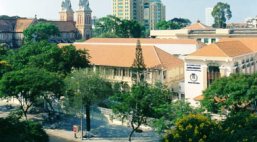Primary Education
The fact that the literacy level in Vietnam stands at 90% may have something to do with the fact that children as young as 18 months of age are admitted to public kindergartens, where they are introduced to arithmetic and the alphabet. Their 12 years of formal education begins at age 6 when they enter compulsory primary school where they will remain for 5 years.
Middle Education
Following that they may enter intermediate education trung học cơ sở although this is not compulsory. If they do, they spend 4 years discovering traditional subjects like languages, math and science in preparation for their remaining 3 years at secondary school.
Secondary Education
Following an entrance examination that determines the quality of secondary school(or
trung học phổ thông) that they will be allowed to enter, students follow a compulsory school curriculum in which they must complete a wide range of programs in order to graduate. These subjects include Literature/Reading, Mathematics, Calculus, Geometry, Physics, Chemistry, Biology, History, Geography, Civics, Foreign Languages, Technology, Information Technology, Physical Education, and Social Studies. Prestigious schools add advanced courses in Natural and Social Sciences.
Vocational Education
Since 1987, the Vietnamese authorities have struggled to weld hundreds of vocational colleges into an effective mechanism capable of meeting the labor requirements of a rapidly emerging economy. Two broad programs are offered. These are 1-3 years vocational training, and 2 - 3 years vocational & technical education. Quality is monitored centrally.
Tertiary Education

Securing a place at university with a high secondary school grade, and in addition high entrance examination marks is an essential career step, especially for young people from poor or disadvantaged communities. They may leave following completion of an undergraduate degree, or remain on for 2-year doctors or 4-year masters qualifications.
The 11 private universities account for just 11% of the total. Although popular, these face challenges in terms of quality and affordability, and, of course legendary Vietnamese red tape too.

 Securing a place at university with a high secondary school grade, and in addition high entrance examination marks is an essential career step, especially for young people from poor or disadvantaged communities. They may leave following completion of an undergraduate degree, or remain on for 2-year doctors or 4-year masters qualifications.
Securing a place at university with a high secondary school grade, and in addition high entrance examination marks is an essential career step, especially for young people from poor or disadvantaged communities. They may leave following completion of an undergraduate degree, or remain on for 2-year doctors or 4-year masters qualifications.